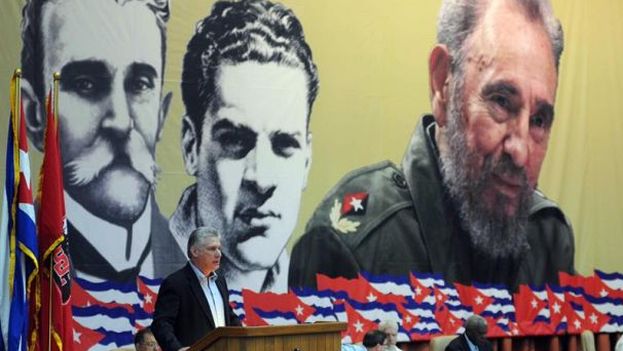
![]() 14ymedio, Reinaldo Escobar, Havana, 20 April 2016 — The most notable departures from the Central Committee of the Party elected at the Seventh Congress are: Rolando Alfonso Borges, who until now headed the ideological department dedicated to controlling the media; Yolanda Ferrer Gómez, who served as head of the International Relations Committee of the National Assembly of People’s Power and who spent long years as a second to Vilma Espin, Raul Castro’s late wife, in the Federation of Cuban Women (FMC); Agustin Lage Davila, brother of ousted Carlos Lage — former vice president of the Council of State and member of the Politburo– and director of an important scientific center; Abel Prieto Jimenez, cultural affairs advisor to the president; and Harry Villegas Tamayo, survivor of Ernesto Guevara’s guerrilla actions in Bolivia.
14ymedio, Reinaldo Escobar, Havana, 20 April 2016 — The most notable departures from the Central Committee of the Party elected at the Seventh Congress are: Rolando Alfonso Borges, who until now headed the ideological department dedicated to controlling the media; Yolanda Ferrer Gómez, who served as head of the International Relations Committee of the National Assembly of People’s Power and who spent long years as a second to Vilma Espin, Raul Castro’s late wife, in the Federation of Cuban Women (FMC); Agustin Lage Davila, brother of ousted Carlos Lage — former vice president of the Council of State and member of the Politburo– and director of an important scientific center; Abel Prieto Jimenez, cultural affairs advisor to the president; and Harry Villegas Tamayo, survivor of Ernesto Guevara’s guerrilla actions in Bolivia.
To those who stepped down is added more than a hundred who died, destitute and retired, who were on the list of the 142 members of the Central Committee elected at the 5th Congress, which was the last time before the just completed conclave that elections were held, as in the 6th Congress they were not. From that list from 1996 there are now only 33 remaining.
From those who were handpicked over the last 19 years, 32 have keep their positions. It is noteworthy that Joaquín Bernal, the current Minister of Culture who is often presented as a member of the select group, has been left off the list, along with others unknown whom no one would miss. If the math does not fail us, we can assume that there are 77 new entrants, representing more than 50% of the total membership.
The perception of paralysis resulting from a reading of the documents adopted at the event contrasts with this remarkable injection of fresh blood, but it is reinforced by the fact that most of the members of the Politburo have remained in their positions, and especially by the presence of Raul Castro and Jose Ramon Machado Ventura, who have given the impression of being the only ones who know what can be changed in the so-called process of perfecting the system.
If something positive happened at the Palace of Conventions in recent days it is that the prediction that there would be a nepotistic trend, raising some of the heirs to the name of Castro to the highest Party structures, was not fulfilled. Everyone knows how the list of candidates that is “analyzed and discussed” by the delegates is drawn up. It has not transpired that anyone has objected to a name or questioned any absence from the list. So it is designed, and so it was approved by unanimous vote.
If they follow the new requirements established related to age, in the 8th Congress it could be that very few of the current members of the Central Committee will be reelected. But 2021 is too far away to make predictions, and in this game not everything is decided because the dominoes are shuffled face down.
